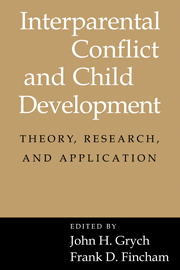Book contents
- Frontmatter
- Contents
- List of Contributors
- Preface
- Interparental Conflict and Child Adjustment: An Overview
- Part One Foundations
- 1 Conceptual Issues in Understanding the Relation between Interparental Conflict and Child Adjustment: Integrating Developmental Psychopathology and Risk/Resilience Perspectives
- 2 The Study of Relations between Marital Conflict and Child Adjustment: Challenges and New Directions for Methodology
- 3 Does Gender Moderate the Effects of Marital Conflict on Children?
- 4 Ethnic Minority Status, Interparental Conflict, and Child Adjustment
- Part Two Basic Processes
- Part Three Family and Peer Contexts
- Part Four Applications
- Part Five Future Directions
- Author Index
- Subject Index
3 - Does Gender Moderate the Effects of Marital Conflict on Children?
Published online by Cambridge University Press: 01 May 2010
- Frontmatter
- Contents
- List of Contributors
- Preface
- Interparental Conflict and Child Adjustment: An Overview
- Part One Foundations
- 1 Conceptual Issues in Understanding the Relation between Interparental Conflict and Child Adjustment: Integrating Developmental Psychopathology and Risk/Resilience Perspectives
- 2 The Study of Relations between Marital Conflict and Child Adjustment: Challenges and New Directions for Methodology
- 3 Does Gender Moderate the Effects of Marital Conflict on Children?
- 4 Ethnic Minority Status, Interparental Conflict, and Child Adjustment
- Part Two Basic Processes
- Part Three Family and Peer Contexts
- Part Four Applications
- Part Five Future Directions
- Author Index
- Subject Index
Summary
Although exposure to high levels of marital conflict increases children's susceptibility to psychological maladjustment, the modest magnitude of the risk and the considerable heterogeneity in children's outcomes have precipitated the development of multivariate models designed to explicate conditions that moderate the risk of marital conflict. As part of this process, child and parent gender are assuming increasingly prominent roles as sources of the variability in child outcomes. The evolution of gender in models of interparental relations is underscored by the distinction between two generations of marital conflict research (Fincham, 1994). A first generation of research has focused on documenting an association between marital and child functioning. Within this generation of research, gender has either been commonly treated as a nuisance variable that is statistically controlled, pooled in primary analyses, or eliminated by design (e.g., exclusive focus on boys) (Davies & Windle, 1997; Johnson & O'Leary, 1987), or examined as a main effect (e.g., examining mean differences between boys and girls in the levels of exposure to interparental conflict). However, these main effects models fail to address a critical task of understanding how and why child gender may alter the association between marital conflict and child adjustment (Fincham, Grych, & Osborne, 1994; Kerig, Fedorowicz, Brown, Patenaude, & Warren, 1998).
A fundamental aim of the second generation of research is to specify the precise conditions that exacerbate or attenuate the risk posed by marital conflict (i.e., moderator models).
- Type
- Chapter
- Information
- Interparental Conflict and Child DevelopmentTheory, Research and Applications, pp. 64 - 97Publisher: Cambridge University PressPrint publication year: 2001
- 92
- Cited by



